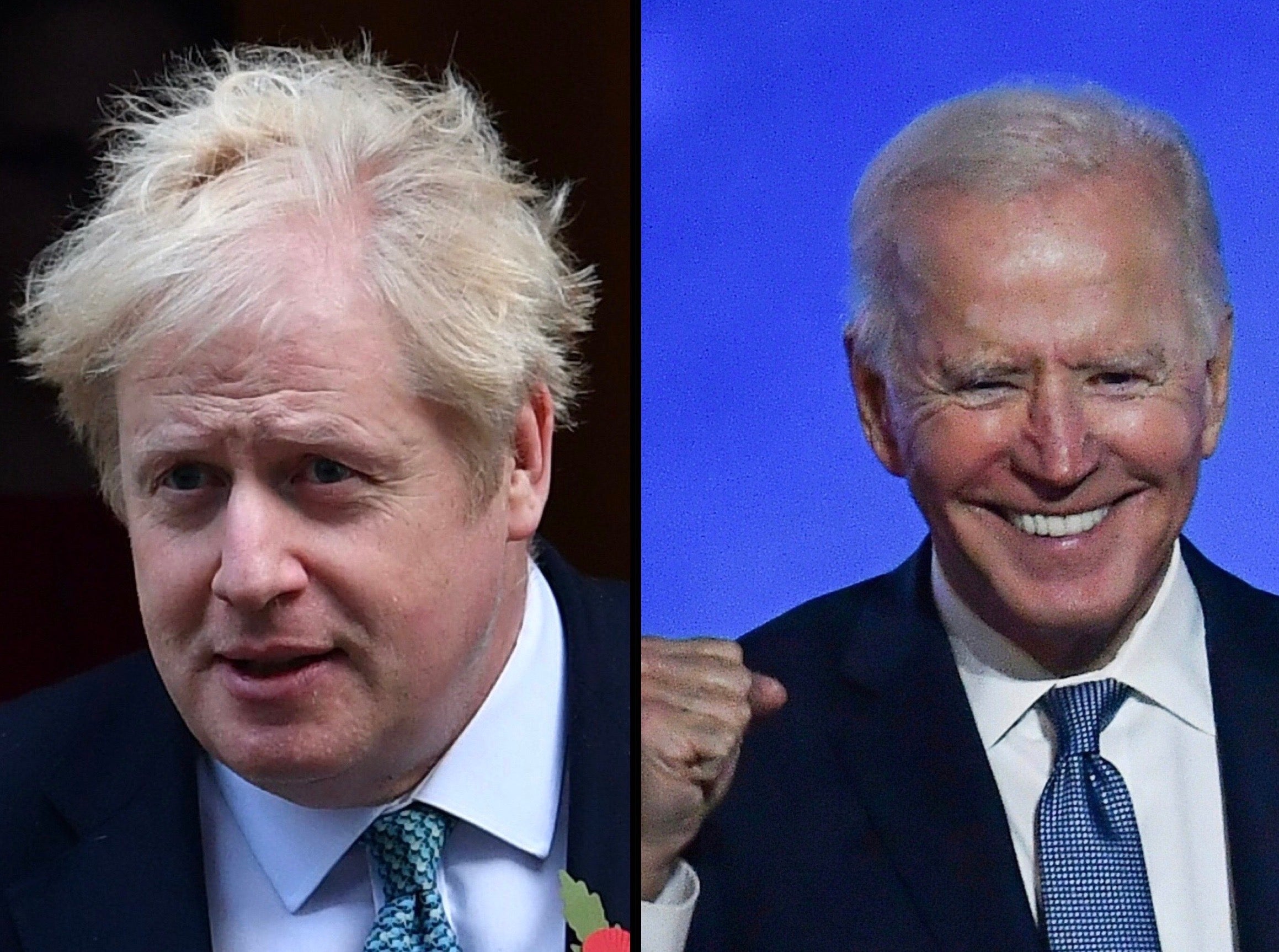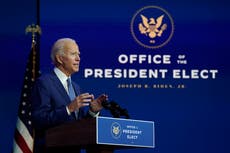Joe Biden and the Democrats’ disdain for Boris Johnson poses a problem for the prime minister
Muted in public, but more pronounced in private – there has been plenty of criticism from across the Atlantic, writes Kim Sengupta


The video shows a BBC journalist shouting “Mr Biden, a fast phrase for the BBC”. America’s next president asks “The BBC?” before saying with a broad smile: “I’m Irish.”
The clip, broadcast at the weekend as part of a package charting Joe Biden’s path to the White House, has gone viral. It is seen as an affirmation of affection for his family’s roots in County Mayo. It also has another resonance now with the impact the new presidency will have on Britain and Brexit.
There is growing realisation in Boris Johnson’s government about the price that may have to be paid for continuously cosying up to Donald Trump, the cavalier approach to the Good Friday Agreement, and lack of effort to build bridges with Biden and his campaign until too late in the election campaign when he had surged ahead in the polls.
The fabled trade deal with the US, which was supposed to be the crowning glory of Brexit, is now no longer being fast-tracked as the Trump administration had been claiming. One need not take President Obama’s warning that the UK will be “at the back of the queue” literally, but there will be no desire to rush it through in Washington either.
Downing Street is still publicly insisting that it will go ahead with the Internal Markets Bill which reneges on part of the EU withdrawal agreement, abandons the Northern Ireland Protocol, and takes away the protective measures against a hardened border between the north and south.
On Monday the government lost a vote 433 to 165 on a Lords amendment on the bill, with Lord Eames, the former primate of all Ireland, speaking about the fragility of the peace process. Lord Clarke, the former Tory home secretary and chancellor, accused the government of a “Donald Trump-like gesture”.
Biden has repeatedly stressed the imperative of preserving the Good Friday Agreement, pointing out that “any trade deal between the US and UK must be contingent upon respect for the agreement and preventing the hard border.”
This is hardly a new position from the Democrats. In March last year Chris Murphy, the Connecticut Senator, warned during a visit to London of apprehension that a hard Brexit would inevitably “blow up” the Northern Ireland peace process.
Murphy pointed out that there was a strong bipartisan view in Congress that there would be no trade deal with the UK if there was any risk to the Northern Ireland peace process. The British government was making a big mistake in listening to Donald Trump’s call for a hard Brexit, he said, as he professed surprise that the UK was seemingly putting all its eggs in the Trump basket.
“Trump has worked himself into a box where he is demanding a hard Brexit which would shatter the peace process, which would then quell any interest in congress to support a trade agreement with Britain. There’s a circular firing squad here that the president has created.” Murphy told me.
“The Irish American lobby, of which I am a member, is pretty powerful in the US as you know … The head of the Committee on Overseas Trade in the House is Richie [Richard] Neill, who is the most prominent member of the Irish American caucus and he will be asking lots of questions, you can be sure, about the peace process before anything happens,” he added.
Nancy Pelosi, the House of Representative speaker reiterated a few month later: “Whatever form it takes, Brexit cannot be allowed to imperil the Good Friday Agreement, including the stability brought by the invisible and frictionless border between the Irish Republic and Northern Ireland. The UK must respect the Northern Ireland Protocol as signed with the EU to ensure the free flow of goods across the border.”
Apart from Brexit, it has been noted only too well by the Democrat leadership that while other western European leaders like Emmanuel Macron and Angela Merkel began to stand up against Trump’s excesses, Johnson continued to remain pliant.
British diplomatic sources say it was difficult to get ministers visiting Washington to even meet Democrats. At the same time, a steady stream of Brexiters heading across the Atlantic to pay their homage to the US president.
There is something more. It has also become personal between the Democrats and Johnson. This distaste has been much vented privately, but even publicly Biden has called the prime minister the “physical and emotional clone of Donald Trump”.
Among other issues there has been anger at Johnson saying that Obama’s attitude to Britain was based on his “part-Kenyan” heritage and “ancestral dislike of the British Empire”. Tommy Vietor, former national security spokesperson to Obama, responding to a congratulatory message to Biden from Johnson, called him a “shapeshifting creep,” adding: “We will never forget your racist comments about Obama and slavish devotion to Trump.”
There are other aspects of Johnson’s behaviour which has been noted by American officials. There was dismay, in particular about his failure to stand by Kim Darroch, the British ambassador to Washington who was forced to resign after his leaked diplomatic cables about the Trump presidency angered the president.
A number of senior American diplomats knew Darroch well and liked and respected him. Some of them drew analogies between Johnson’s treatment of Darroch and the way Trump has acted against officials in the administration who were deemed to be insufficiently loyal.
One comparison was with Marie Yovanovitch, the US ambassador to Ukraine who was smeared by Trump and his coterie and forced to leave her job for refusing to join a push to get the Ukrainian government to investigate the business affairs of Joe Biden and his son Hunter. The sacking of the defence secretary, Mark Esper, on Monday was just another example of this punitive behaviour.
The prime minister got his expected call from the president-elect on Tuesday. But even that was preceded by the embarrassing revelation that Downing Street’s congratulatory message to Biden and vice-president elect Kamala Harris appeared to have been superimposed on one for Trump with the words “ look forward to working closely together” and “ second term” and “ shared priorities”.
A government spokesman sought to explain that messages had been prepared for the two candidates and one had been “embedded in the background of the graphic” due to a “ technical error”. This was amateurish at best and not a mistake which other states are known to have made.
It is fortunate that Darroch has been succeeded as Ambassador in Washington by the highly esteemed and experienced Karen Pierce someone who the Americans know from her previous posts in, among other places, the UN and Afghanistan.
Meanwhile, after initial euphoria at the early results of the US election which showed Trump to be winning, the Brexiters are now in despair. While Rupert Murdoch looks to be washing his hands with Trump in the US, in the UK there are headlines in some right-wing news outlets like “Biden... is no friend of Britain”.
A three-year-old photograph was produced in one story of Biden with Gerry Adams and Rita O’Hare, the Sinn Fein representative in the US. One can, of course, find photographs of Gerry Adams with Prince Charles, and there are photos of Martin McGuinness with the Queen. Both the men were alleged to have been part of the IRA Army Council, something both denied. These are rightly seen as examples of how leaders strive to put behind enmities of the past for the sake of peace.
O’Hare, who was once arrested for an attack on a British Army officer in Belfast, was among those who were told by the British government that they would not face arrest under the Northern Ireland peace process.
Supporters of a no-deal Brexit fear the double punishment of also being neglected by an unsympathetic US administration and that is a fully justified matter of concern. Although, there is now a chance that after all the sabre rattling the British government will come to an agreement with the EU.
It is very unlikely, however, that there will be a “special relationship” between Biden and Johnson. And Biden, as the president of the world’s only current superpower, will have much less to worry about that than the prime minister as Britain sets off into its uncertain post-Brexit future.




Join our commenting forum
Join thought-provoking conversations, follow other Independent readers and see their replies
Comments